- Home
- Sherry Thomas
Ravishing the Heiress Page 12
Ravishing the Heiress Read online
Page 12
“You say it as if I don’t know what the consequences are.”
“You know exactly what the consequences are. But you don’t believe they could happen to you.”
“And why should they? I have been rigorously careful.”
“Have you? Three nights at Huntington I observed you come and go from your assignations—you didn’t notice a thing. On the last night, another couple on their secret rendezvous was headed right in your direction. I had to divert them. After that I had no choice but to speak to your family.”
She had not known this, but still her ire rose. “And bilk a kiss from me besides.”
“For someone who deals with writers, you should choose your words with greater care.” He smirked. “I came by my kiss honestly.”
The lecher.
“And how do you like my book? Does it not astound you with its literary finesse?”
“We are talking about smut with dirty drawings.”
“Ah, so you have been reading.”
“I glanced through two pages and that was enough for me.”
He smiled. “It’s that good, eh?”
Her breath caught. “It is a waste of paper. And what are you doing here, anyway?”
“I’ve come to welcome our duchess back to London. She is practically my sister, too. Now if you’ll excuse me.”
“Where are you going?” she was not so much curious as suspicious.
“Fitz will be here soon. Martin might know everything that happened in East Anglia before Canute the Great made it a mere fiefdom, but I see he doesn’t have the sense to remove himself and avoid giving the impression that he has come to meet you.”
“He hasn’t. He happens to be on his way to Oxford.”
“All the more reason not to give Fitz the wrong ideas. If there is no misconduct, then you shouldn’t waste people’s suspicion.”
He ambled off, took Andrew by the shoulder, and guided him away.
Fitz arrived at the rail station to find Helena and Hastings standing together, speaking in that particular push-pull rhythm of theirs. Fitz listened to their exchange of mildly veiled insults with his usual amusement—and a twinge of melancholy. It was a testament to Hastings’s skill and determination that Helena, after all these years, still did not realize he was in love with her. But what good was such love, too proud to make itself known?
He wondered whether the same applied to his wife. Once she had her freedom, would she be too timid to pursue her fellow, to whom she’d remained chastely devoted all these years?
An odd thing, his continued anonymity. She did not make her debut until after she was Lady Fitzhugh, so she could not have been acquainted with many young men before she married. In the intervening years, Fitz had met most of the Graveses’ social set and never once had he come across a man who elicited any reaction in her.
“My goodness, Mrs. Englewood!” Hastings cried. “What an adorable coincidence running into you.”
Fitz was jolted out of his reverie. Isabelle, in a promenade dress of black velvet, appeared at Fitz’s elbow. She shook hands warmly with both Hastings and Helena. “Adorable, yes, coincidence, no. Fitz told me that the duchess is due back this afternoon. I am dying to meet her new husband and see her again—as well as the rest of you. How could I pass the opportunity when I know that everyone will be gathered here?”
Everyone, including Millie.
Had she been anyone else, Fitz would have suspected her of trying to usurp Millie’s place. But Isabelle was a creature of impulses, not wiles. There was no malice to her, nor machinations.
All the same, this was ill done of her. Inserting herself openly into a family occasion—she might as well take out a notice in the papers stating their intention to set up a household together. No matter how romantic a reunion of young lovers, he would still be committing adultery and he preferred to do so discreetly, and not give his wife reasons to think she’d been publicly thrown over.
He was not alone in his reaction. Once Helena and Hastings realized that Isabelle had come deliberately and would remain with them, they both glanced toward the gates of the platform: It was only a matter of time before Millie arrived.
And then they both glanced at Fitz with uncertainty—and more than a little anxiety on Helena’s part—trying to gauge his reaction, to determine whether he approved of Isabelle’s action or whether he shared their unease.
Venetia’s train pulled into the station. She and her husband, the Duke of Lexington, stepped down from the duke’s private rail coach. The two had supplied the bulk of the gossip for the early part of the Season, culminating in an elopement that had shocked everyone, members of their families included. Fitz had guessed more of the reasons behind their sudden marriage than most, but still he’d worried, until the couple had come for a quick visit to London not long ago and he’d seen for himself how happy and relaxed Venetia was in her new marriage. They had then returned to the duke’s estate in the country for the rest of their honeymoon and were only now rejoining Society, beginning with the ball in their honor, hosted by Fitz and Millie—the same night they would consummate their marriage.
Only two days away now.
Helena waved. Venetia waved back, all smiles. The crowd hushed—Venetia was the great beauty of their generation and her appearance often caused awed silences. But as she walked arm in arm with her husband toward her family, the gawkers gradually returned to their own concerns.
Her smile faltered as she saw Isabelle. Perhaps her hand tightened on her husband’s arm also, for the duke bent his head toward her. Fitz could not tell what question he asked, but her answer, judging by the movement of her lips, seemed to be, Everything is fine. I’ll tell you more later.
She was warm and gracious as she greeted Isabelle and introduced her husband. They were all old friends. Isabelle and Hastings had pulled many a prank together when the boys visited the Pelham house. She and Helena had always got on well. And Fitz had learned, from a remark Helena let stray years ago, that in the days leading up to his wedding, Venetia had spent many hours holding Isabelle’s hand as the latter wept and raged against the cruelty of fate.
This, then, should have been a more buoyant reunion. But Isabelle alone brought the delight and the vivacity. She was thrilled for Venetia’s match with the duke. She made hearty digs at Hastings for Helena’s continued scorn of him. She could not wait to be more settled so that she could throw a dinner for the old gang.
Everyone else was cordial in their manners, but their smiles reminded Fitz of those one put on when faced with an overly chatty vicar.
“Yes,” said Isabelle, as they walked toward the exit and the carriages that awaited beyond. “I do enjoy it. And did Fitz tell you? He was the one who arranged for the house.”
Swift, inscrutable glances darted Fitz’s way.
“Fitz is terribly modest,” said Venetia. “Not for him to boast what he has done for his friends.”
Isabelle laughed. “Modest, Fitz? When did you become modest? I remember you bragging with the best of them.”
He had, hadn’t he? He’d strutted, too, as young, athletic boys so often did. One could say having his dreams executed before his eyes killed his swagger outright. But the truth was, he’d always admired quiet confidence better than braggadocio and would have moderated his bluster at some point, even if life hadn’t beat him to it.
“Modesty is a more appealing quality in an older gentleman such as myself.”
Isabelle laughed. “Oh, how funny.”
He had meant to poke fun at himself but what he said was not a joke.
“So, my dear Mrs. Englewood, what are your plans now that you are back?” asked Hastings.
“Oh, so many of them.” Isabelle turned her face toward Fitz, her look of anticipation unmistakable.
Hastings tapped his fingers against the handle of his walking stick. Venetia adjusted the angle of her hat. Helena tugged at the brooch at her throat. Isabelle might not recognize the signs but they were uncomforta
ble, especially his sisters.
“Mrs. Englewood is going to visit her sister in Aberdeen in a day or two,” Fitz said.
“Oh, how delightful,” said Venetia. “Will you stay for a while? Scotland is lovely this time of the year.”
There was hope in her voice.
“No, a week at most. I will visit her for a longer time after the end of the Season but for now I shall miss London too much.” She gazed again at Fitz, not caring that she was essentially flirting—possibly even thrilling to it.
Perhaps Fitz had shot well past modesty into outright prudery. But Isabelle had children and he a wife. They ought to be more circumspect in their public conduct, even if they were only before his family and his most trusted friend.
Then he saw her, Millie, descending from her brougham, looking right and left preparing to cross the street. Her eyes landed on him at the same moment. But the pleasure on her face faded away as she took in the sight of Isabelle walking next to him, comfortably ensconced among members of his family.
In her place.
She blinked a few times, her sweet, delicate face straining for composure. Lowering her head, she turned around and climbed back into the brougham.
It drove away, inconspicuous, one vehicle in a sea of carriages.
Alice was in her usual place on the mantel of Fitz’s study, her eyes closed, her tail curled around her plump little body. The clear glass bell jar that protected her from dust and moisture provided a clue that she’d long ago departed for the hereafter, but she remained so lifelike Millie still expected her to stir and wake up.
“I’ve been looking for you everywhere in the house,” came her husband’s voice behind her. “Why didn’t you join us?”
Millie did not immediately turn around. She needed a minute to pull herself together. The sight of the Fitzhugh party coming out from the rail station was still seared in her mind, Isabelle retaking her place as if the past eight years never happened. “You are back early,” she said. “I thought everyone was to take tea at the duke’s house.”
“Everyone includes you and I’ve come to get you.”
He had spoken to her of fairness when she’d have put their pact on a bonfire and burned it. No doubt he was again motivated by his need to restore her to her rightful place. But she wanted to be an inseparable part of his heart, not a consideration for his conscience. “It will be awkward with Mrs. Englewood there.”
“She won’t be there.”
He joined her at the mantel, the shoulder of his day coat speckled with drops of water—it had started to rain as she’d reached home. And then, utterly unexpected: his hand on the small of her back; his lips on her cheek.
The gesture was more familiar than intimate. Still, they did not greet each other this way: nods and smiles, perhaps, but not kisses on the cheek that left an etching of heat upon her skin.
He turned the bell jar a few degrees. “I never asked you, Millie. But why did you have Alice preserved?”
Sometimes Millie forgot that it had been her idea. No, more than her idea: She’d also been the one to engage the services of a taxidermist. “You loved her so much I couldn’t bear to put her underground.”
He was silent, his thumb rubbing against the small plaque that bore Alice’s name.
“Do you miss her still?” she asked.
“Not as much as I used to. And when I do miss her—she was a fixture of my school days, to think of her is to remember what it was like to be seventeen and without a care in the world.”
“You miss your old life.” It was a given, but still she hurt to be reminded of it.
“Doesn’t everyone, from time to time?” He replaced the bell jar and turned toward her. “Ten years from now I’m going to miss my life as it is today, simply because I will never be twenty-seven again. There is always something worth remembering in every stage of the journey.”
“Even in the year you married?”
“Yes.” His expression was—surely she deluded herself—nostalgic. “Demolishing the north wing, for one—that opportunity will not come again. Mrs. Clements telling the colonel to shut up. Our conversation about the commodes with the queen’s portrait inside—still one of the funniest things I’ve ever heard.”
She didn’t know why it should be so, but her eyes tingled with tears. It had been a horrible year, but his words carried a great fondness—for this most arduous time of their life together. As if in looking back, the grief and the anguish had been sifted away, and only the gems remained—moments of camaraderie, memories that shone.
“Of course,” he said, smiling, “how can I forget, your panic over my determination to kill myself with a dummy rifle.”
Her voice caught. “You will never let me live that down, will you?”
“No. I can’t believe it: We never did give you any firearm lessons, did we?”
“There were always more pressing concerns.”
“We’ll do it this year—make you a crack shot in no time.”
“I’m sure the grouse will happily disagree as I miss every last one of them.”
“Grouse isn’t the only thing to shoot. The seasons for partridge and pheasant don’t end until first of February. And that’s plenty of t…”
His voice trailed off.
Understanding came all too swift to Millie, like a tropical sunset that abruptly turned day into night. There was no next year for them. Come January he would go to Mrs. Englewood.
“It’s all right,” she said gamely. “Not all of us are meant to be crack shots.”
He looked at her as if he hadn’t seen her in a very long time. Or perhaps, as if he might never see her again, and must memorize her features one by one.
When he finally spoke, he said, “They are still waiting for us for tea, you and me. Shall we go?”
CHAPTER 9
The Partnership
1889
Millie’s father died three weeks after Alice. But whereas Alice had given every indication that she was not long for this earth, Mr. Graves’s heart failed unexpectedly. He was forty-two.
Millie was stunned. Her mother was incoherent with shock. Thankfully, as he had done after Mr. Townsend’s passing, Lord Fitzhugh stepped in and took charge of the arrangements.
Mr. Graves’s will was simple enough. He settled a number of trusts on longtime retainers and employees, gave miscellaneous gifts to members of his extended family, provided generously for his widow, and left all of Cresswell & Graves Enterprises to Millie.
After the funeral, Mrs. Hanover, Millie’s aunt, suggested that Mrs. Graves, devastated by grief, would do well to spend some time in a bright and cheerful place. Millie and Mrs. Hanover together accompanied Mrs. Graves to Tuscany, to recuperate in a sun-drenched landscape of cypresses and vineyards.
They’d planned to stay for at least three months. But a month into their sojourn, a letter came for Millie from her husband. He dutifully wrote once a week—short missives that numbered not more than five sentences between greetings and salutations. But this letter was three pages, front and back.
He had performed an audit of the firm, from its accounts and records to its factories and other physical assets. He had also spoken with a number of retailers who sold Cresswell & Graves wares.
Mr. Graves, during his tenure, had been excessively cautious. The plum pudding and the mackerel had been the only new products added to the line during the past decade. His philosophy had been to produce few products and produce them well. With the ever expanding number of companies that daily introduced more varieties to the market, Cresswell & Graves still sold about the same number of products from year to year, but they were becoming a smaller and smaller percentage of the retailers’ stock.
Moreover, they could not even boast their wares as the best-made tinned goods anymore. Yes, their ingredients were still carefully sourced and thoroughly inspected, and the manufacturing process was clean and conscientious, but newer technologies and production methods had become available in the pas
t ten years—means to make preserved foods taste fresher and last longer—and Cresswell & Graves had adopted none of them.
The company was stagnating. In Lord Fitzhugh’s opinion, they had not yet reached a point of crisis. But should things continue at the same sluggish pace, it might not be long before they were moribund.
Change must happen. If they didn’t initiate the change now, it would be forced upon them soon. He meant to convene a meeting of lawyers and managers and discuss a new, more energetic direction for the company. Would Lady Fitzhugh join him?
Millie was dumbfounded—almost more by his request than by the company’s declining fortunes. From birth she’d been trained to be a lady. She knew nothing about the business. She’d never set foot in one of Cresswell & Graves’s factories. And until her honeymoon, never eaten from a tin.
It seemed almost blasphemous for her to participate in the running of the business in any capacity. Her mother never had. Her father, were he still alive, would be scandalized by any involvement on Millie’s part.
“What should I do?” she asked her mother.
“What do you wish to do?” said Mrs. Graves. She still looked pale and fragile in her widow’s weeds, but her old strength of mind was returning.
“I’d like to do what I can to help Lord Fitzhugh—and myself. But I’m not sure what my presence will accomplish. I haven’t the slightest experience when it comes to matters of business.”
“But the firm belongs to you. Without your support, Lord Fitzhugh cannot take over the management of it.”
“I’m astonished he wants to.” Lordships didn’t involve themselves in the nitty-gritty details of how their money was made.
Mrs. Graves tilted her embroidery frame to better examine it in the light. “I approve. A young man should have ambitious tasks with which to occupy himself. Even with all the work that remains to be done at Henley Park, the majority of the improvements will finish sometime in the not-too-distant future. But an ongoing concern such as Cresswell & Graves will always keep the man in charge busy.”

_preview.jpg) Claiming the Duchess (Fitzhugh Trilogy Book 0.5)
Claiming the Duchess (Fitzhugh Trilogy Book 0.5)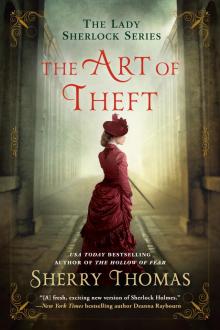 The Art of Theft
The Art of Theft The Magnolia Sword: A Ballad of Mulan
The Magnolia Sword: A Ballad of Mulan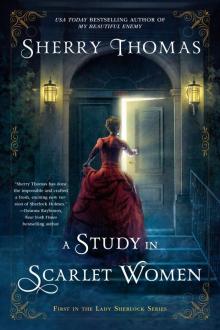 A Study In Scarlet Women
A Study In Scarlet Women The Hollow of Fear
The Hollow of Fear The Magnolia Sword
The Magnolia Sword Beguiling the Beauty ft-1
Beguiling the Beauty ft-1 The Heart is a Universe
The Heart is a Universe The Hidden Blade: A Prequel to My Beautiful Enemy (Heart of Blade)
The Hidden Blade: A Prequel to My Beautiful Enemy (Heart of Blade)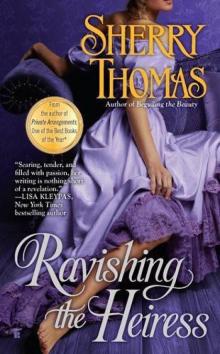 Ravishing the Heiress ft-2
Ravishing the Heiress ft-2 The Immortal Heights
The Immortal Heights The Hidden Blade
The Hidden Blade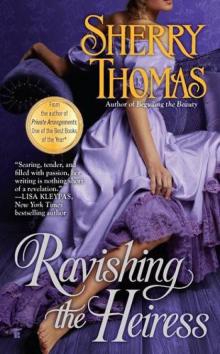 Ravishing the Heiress
Ravishing the Heiress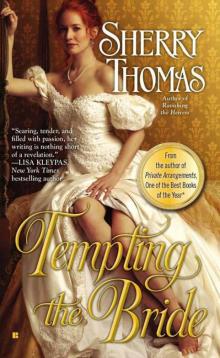 Tempting the Bride
Tempting the Bride The Luckiest Lady in London
The Luckiest Lady in London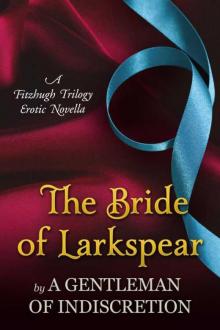 The Bride of Larkspear: A Fitzhugh Trilogy Erotic Novella
The Bride of Larkspear: A Fitzhugh Trilogy Erotic Novella Claiming the Duchess
Claiming the Duchess The One in My Heart
The One in My Heart His At Night
His At Night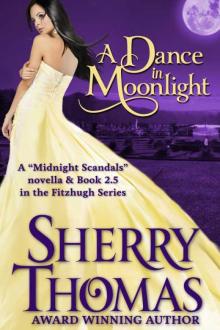 A Dance in Moonlight
A Dance in Moonlight A Conspiracy in Belgravia
A Conspiracy in Belgravia Not Quite a Husband
Not Quite a Husband